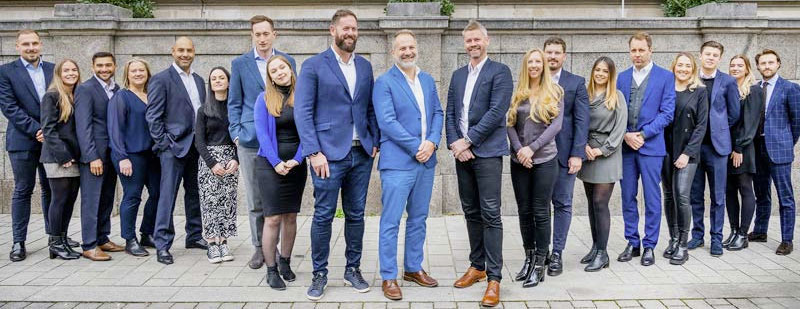
Deutsche Bank mortgages vs high street lender mortgages
When comparing Deutsche Bank mortgages to those offered by high street mortgage lenders there are a few important distinctions to keep in mind. Your choice will depend heavily on your financial situation, income level, property type, and borrowing needs.
High-street lenders like Barclays, HSBC for Intermediaries, NatWest, and Santander for Intermediaries are offering mortgages with amounts of £1 million or more, priced at around 4%, and with low arrangement fees. However, applicants will need relatively straightforward finances to qualify for these mortgages.
Click here to view our £1 million+ mortgage best buy table.
1. Target Clientele For Deutsche Bank And High Street Mortgage Lenders
-
Deutsche Bank:
-
Typically serves high-net-worth individuals (HNWIs) or corporate clients.
-
Mortgages are often bespoke or private banking products, not mass-market.
-
You may need to hold significant assets with the bank to meet the qualification requirements.
-
More likely to offer international mortgage services (e.g., for non-resident buyers or overseas properties).
-
-
High Street Lenders:
-
Focus on mainstream residential and buy-to-let borrowers.
-
Offer products for first-time buyers, home movers, remortgagers, and buy-to-let landlords.
-
Issue larger mortgage loans between £1 million and £10 million with rates priced around 4% if you have a larger deposit.
-
2. Mortgage Types and Flexibility
-
Deutsche Bank:
-
Custom solutions, potentially including multi-currency mortgages, interest-only options, or large-loan facilities.
-
More flexibility in underwriting for complex income (e.g., business owners, international clients).
-
High minimum loan sizes (often £1M+).
-
Not listed on comparison websites or accessible without an introducer or relationship manager.
-
-
High Street Lenders:
-
Offer standard mortgage types, including shorter and longer term fixed, tracker, discount, and offset.
-
Regulated under FCA rules with transparent pricing and eligibility criteria.
-
Less flexibility with unusual income or bespoke terms.
-
Increasingly flexible acceptance criteria to target high-net-worth borrowers.
-
3. Mortgage Interest Rates and Arrangement Fees
-
Deutsche Bank:
-
Rates are often not publicly advertised and are negotiated on a case-by-case basis.
-
Could offer preferential rates for large loans or private clients.
-
May have higher arrangement fees but more scope for structuring the loan tax-efficiently.
-
-
High Street Lenders:
-
Transparent pricing, easily compared. 1.5, 2, 3, and 5-year fixes available.
-
Competitive rates for mainstream products.
-
Arrangement fees typically range from £0 to £1,999, often accompanied by incentives such as free valuations or cashback.
-
Aaron Strutt, product director at Trinity Financial, says: "One bank is offering a two-year fix at 4.21% for mortgages between £2,00,000 and £10 million, and the overall cost for comparison is 5.5% APRC. It does not require assets or investments as part of the process and works with high-net-worth clients.
"The 4.21% rate has a £1,999 arrangement fee on its fixed rates, rather than a 0.25% or 0.5% fee, and has a specialist large loans broker desk that Trinity's brokers have access to. The lender has a reputation for producing fast mortgage offers. Other lenders' two-year fixes start from 3.90% for mortgages between £300,000 and £5 million."
4. Speed and Process
-
Deutsche Bank:
-
Relationship-driven; can offer fast decision-making for high-value deals.
-
Might offer a more white-glove service, especially for complex transactions.
-
-
High Street Lenders:
-
More rigid processes, meaning £1 million+ mortgages can be issued quickly, often within a week or two.
-
Can be slower and involve more bureaucracy (especially with stricter affordability checks), although this does depend on the lender. Many lenders are highly efficient.
- A more bespoke lending team setup to manage applications for high-net-worth clients.
-
5. International and Non-UK Resident Borrowers
-
Deutsche Bank:
-
Very strong in the international mortgage space.
-
Ideal for non-residents buying in the UK or UK residents buying abroad.
-
Experience handling cross-border tax and legal implications.
-
-
High Street Lenders:
-
Often limited or cautious in lending to non-residents.
-
Requires more proof of UK income, deposit and address.
-
6. To Summarise - Should You Use a Private Bank Or a High Street Lender?
It depends on your financial situation. If you qualify for a low mortgage rate with a high street lender, then in some cases it may make sense to opt for lower fixed rates and cheaper setup fees. If your situation is complex, then a private bank may well be the best option.
Call Trinity Financial on 020 7016 0790 to secure a private bank or high street mortgage, book a consultation, or complete our mortgage questionnaire.
The information contained within was correct at the time of publication but is subject to change.
Your mortgage is secured on your property. Your property may be repossessed if you do not keep up repayments on your mortgage
Santander is offering a 3.55% two-year fixed mortgage with a £999 arrangement fee for borrowers with a 40% deposit and moving home. Here is a breakdown of the overall cost and the overall cost for comparison.
A Santander capital and interest mortgage of £1,000,000 payable over 30 years, initially on a fixed rate basis at 3.55% until 02/03/2028 and then on the lender's 7.25% standard variable rate for the remaining 28 years.
The 3.55% rate would require 26 monthly repayments of £4,519.30 followed by 334 payments of £6,365.87. The total amount repayable would be £2,244,112.13 made up of the loan amount, plus interest (£1,249,630.82) and £999 (product fee), £80 (final repayment charge), £25 (completion fee). The overall cost for comparison is 6.3% APRC representative.
Contact Trinity Financial on 020 7016 0790 to determine the cost of your £1 million mortgage.
Another one of the most competitively priced two-year fixes for £2 million mortgages is available through Santander for Intermediaries' large loan team priced at 3.95%.
Wealthier clients with clear credit histories could access £2 million mortgages with monthly repayments of £6,583.33 on interest-only, rising to £9,490.74 on full capital repayment over a 30-year term.
Santander for Intermediaries' 3.95% fixed rate has a £999 arrangement fee and a two per cent early repayment charge in year one, lowering to one per cent in year two. The APRC is 6.7%, and borrowers must put down a 40% deposit to qualify.
The mortgage reverts to the current 6.75% standard variable rate if they do not remortgage or complete a product transfer.
• You can contact one of our consultants by calling 020 7016 0790, or complete our basic enquiry form or mortgage questionnaire for a more detailed initial response.
• You tell us what you are looking for and the property type you want to buy. We assess your mortgage and financial protection needs based on your monthly budget.
• We collect the information and documentation that the lenders and providers need.
• Based on the information supplied, we provide you with illustrations of the most suitable products for your circumstances.
• We then apply on your behalf to secure a mortgage offer as quickly as possible. This is once you have confirmed you are happy to proceed.
• We manage the application through to completion and liaise with all involved parties, including valuers, estate agents, and solicitors.
• Post-completion, we are available for any questions. When you reach the end of your initial product, we can also discuss any further mortgage, will or financial protection product requirements.
As part of our ongoing service commitment, we will contact you at least five months prior to your fixed or tracker rate expiring to ensure you avoid reverting to an expensive standard variable rate.
Interest-only mortgages are popular with high-net-worth individuals and are constantly provided by private banks. These mortgages may help borrowers free up cash for other investments, businesses, or family members.
Most private banks offer interest only. Some private banks can issue interest-only mortgages up to 90% of the property value or through part and part mortgages where some of the loan is on capital repayment.
At Trinity Financial, we constantly monitor the £1 million+ mortgage market. Click here to view our £1 million mortgage table, which highlights the pick of the large loan rates.
https://www.trinityfinancialgroup.co.uk/mortgage-tools/million-pound-mortgage-best-buys/
If you wanted to buy a £3 million house and you had a 25% deposit to put towards the purchase, and you required a £2.25 million mortgage, it may be possible to borrow between five and 5.5 times your salary. This would mean you need to earn around £425,000 each year. Lenders will generally accept around half of your bonus income and income from multiple sources if you are a business owner.













